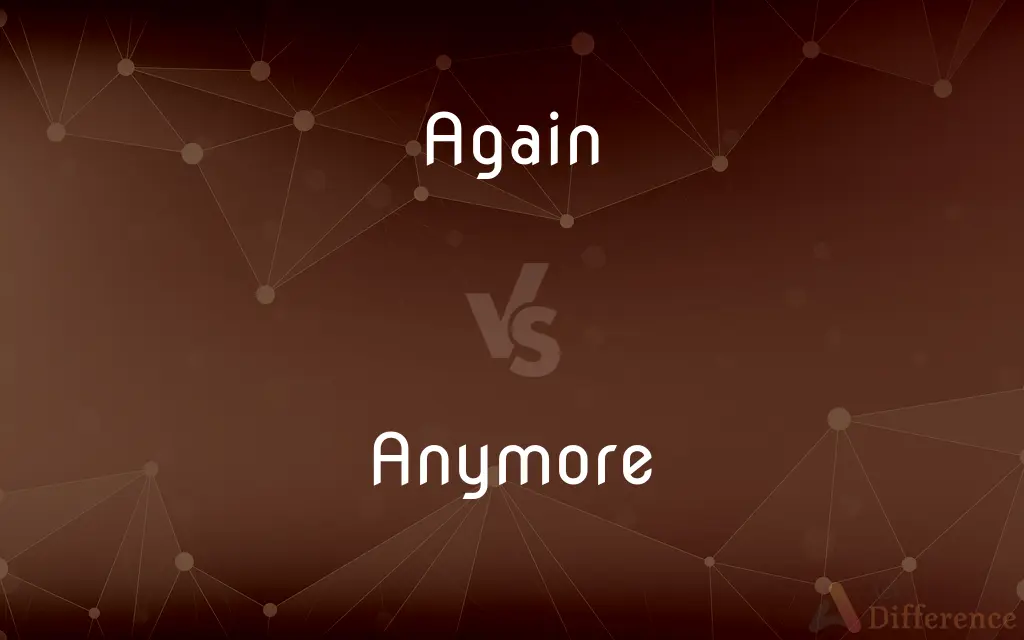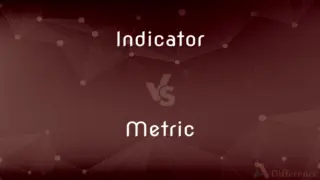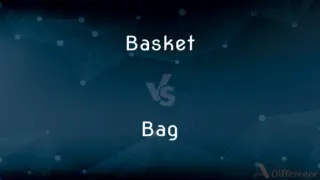Again vs. Anymore — What's the Difference?
Edited by Tayyaba Rehman — By Maham Liaqat — Updated on April 5, 2024
"Again" implies repetition or another instance, whereas "anymore" suggests a cessation or change in status from the past to the present.

Difference Between Again and Anymore
Table of Contents
ADVERTISEMENT
Key Differences
"Again" is used to indicate that something is occurring another time or repeated after an initial occurrence. For example, when someone repeats an action they have done before, they are doing it again. On the other hand, "anymore" is used to express that something no longer occurs or is no longer the case. It is often used to signify a change from past to present, highlighting that what once was true is not true now.
When using "again," the focus is on the recurrence or continuation of an action or event. For instance, saying "Let's watch that movie again" implies the desire to repeat the experience of watching a particular movie. Whereas, using "anymore" in a sentence like "I don't watch that show anymore" indicates that the speaker has stopped watching the show, marking a discontinuation of an action that used to happen.
"Again" can also be part of phrases that suggest a return to a previous state or condition, such as "once again" or "all over again." This usage underscores a process of repetition or restoration. Conversely, "anymore" is typically used in negative constructions or questions to discuss the end of a habitual activity or state, as in "Do you not like chocolate anymore?"
In terms of syntax, "again" is flexible and can appear at various points in a sentence, including the beginning, middle, or end, depending on the emphasis. "Anymore," however, usually appears at the end of a sentence or clause, especially in American English, to denote the end of an ongoing state or activity.
Both "again" and "anymore" serve to contrast past and present, but from different angles. "Again" looks at the past with an eye towards repetition in the present or future, while "anymore" views the past as a contrast to a present where something no longer happens.
ADVERTISEMENT
Comparison Chart
Definition
Indicates repetition or another occurrence.
Indicates a stop or change from the past.
Context
Positive, suggesting continuation.
Negative, suggesting discontinuation.
Typical Usage
In actions or events being repeated.
In actions or states that have ceased.
Syntax
Can be used flexibly in a sentence.
Usually placed at the end of a sentence.
Example
"She decided to take the test again."
"He doesn't go there anymore
Compare with Definitions
Again
Indicates repetition.
He wants to visit Paris again next summer.
Anymore
Indicates a cessation of an action or state.
I don't watch that show anymore.
Again
Used to express a return to a previous state.
After the renovation, the house looked like new again.
Anymore
Typically placed at the end of sentences.
It's not funny anymore.
Again
Flexible placement in sentences.
Again, I would like to remind everyone to submit their reports on time.
Anymore
Often used in negative contexts.
They aren't friends anymore.
Again
Can emphasize continuation.
She’s started writing her novel again after a long break.
Anymore
Used to highlight a change in habit or state.
He doesn't live here anymore.
Again
Refers to another instance.
Please say that again; I didn't hear you the first time.
Anymore
Refers to the present or future in relation to the past.
Going out late doesn't appeal to me anymore.
Again
Once more; anew
Try again.
Anymore
Any longer; at the present
Do they make this model anymore?.
Again
To a previous place, position, or state
Left home but went back again.
Anymore
From now on
We promised not to quarrel anymore.
Again
Furthermore; moreover
Again, we need to collect more data.
Anymore
Chiefly Midland US Nowadays.
Again
On the other hand
She might go, and again she might not.
Anymore
Alternative form of any more.
He doesn't live here anymore.
Again
In return; in response
Paid him again.
Anymore
At the present or from now on; usually used with a negative;
Alice doesn't live here anymore
The children promised not to quarrel any more
Again
Another time; once more.
Again
Over and above a factor of one.
Again
Used metalinguistically, with the repetition being in the discussion, or in the linguistic or pragmatic context of the discussion, rather than in the subject of discussion.
Great, thanks again!
Again
Tell me again, say again; used in asking a question to which one may have already received an answer that one cannot remember.
What's that called again?
Again
I ask again, I say again; used in repeating a question or statement.
Again, I'm not criticizing, I just want to understand.
Again
Here too, here also, in this case as well; used in applying a previously made point to a new instance; sometimes preceded by "here".
Approach B is better than approach A in many respects, but again, there are difficulties in implementing it.
Again
(obsolete) Back in the reverse direction, or to an original starting point.
Bring us word again.
Again
Back (to a former place or state).
We need to bring the old customs to life again.
The South will rise again.
Again
(obsolete) In return, as a reciprocal action; back.
Again
(obsolete) In any other place.
Again
(obsolete) On the other hand.
Again
Moreover; besides; further.
Again
(obsolete or dialectal) Against.
Again
In return, back; as, bring us word again.
Again
Another time; once more; anew.
If a man die, shall he live again?
Again
Once repeated; - of quantity; as, as large again, half as much again.
Again
In any other place.
Again
On the other hand.
Again
Moreover; besides; further.
Again, it is of great consequence to avoid, etc.
Again
Against; also, towards (in order to meet).
Albeit that it is again his kind.
Again
Anew;
She tried again
They rehearsed the scene again
Common Curiosities
What does "anymore" mean?
"Anymore" means no longer, indicating that something that used to happen does not happen now.
Can "again" and "anymore" be used interchangeably?
No, they have different meanings and are used in different contexts.
Can "again" be used to correct someone?
Yes, "again" can be used to request repetition for clarification or correction.
Where is "anymore" typically placed in a sentence?
"Anymore" is typically placed at the end of a sentence or clause.
Can "again" be used in negative contexts?
While less common, "again" can be used negatively, e.g., "Not again!"
How does the use of "again" affect sentence structure?
"Again" is versatile and can fit smoothly in various parts of a sentence without altering its structure significantly.
Can "anymore" start a sentence?
It's unusual and generally not stylistically preferred for "anymore" to start a sentence.
How does "again" function in a sentence?
"Again" can function at various points in a sentence to indicate repetition or resumption.
Is "anymore" used in positive statements?
"Anymore" is usually used in negative statements or questions to indicate cessation.
Does "anymore" suggest a permanent change?
"Anymore" suggests a change but does not specify if it is permanent or temporary.
What does "again" mean?
"Again" means another time or once more, indicating repetition or continuation.
Can "again" indicate a desire?
Yes, "again" can indicate a desire to experience something another time.
What's the difference in tone between "again" and "anymore"?
"Again" often has a neutral or positive tone, while "anymore" typically has a negative tone.
Do "again" and "anymore" have equivalents in other languages?
Yes, most languages have their equivalents or ways to express these concepts, though the exact usage and placement can vary.
Is "anymore" always negative?
Mostly, yes, as it denotes the end of an occurrence, but context can shift its perception.
Share Your Discovery

Previous Comparison
Indicator vs. Metric
Next Comparison
Basket vs. BagAuthor Spotlight
Written by
Maham LiaqatEdited by
Tayyaba RehmanTayyaba Rehman is a distinguished writer, currently serving as a primary contributor to askdifference.com. As a researcher in semantics and etymology, Tayyaba's passion for the complexity of languages and their distinctions has found a perfect home on the platform. Tayyaba delves into the intricacies of language, distinguishing between commonly confused words and phrases, thereby providing clarity for readers worldwide.














































